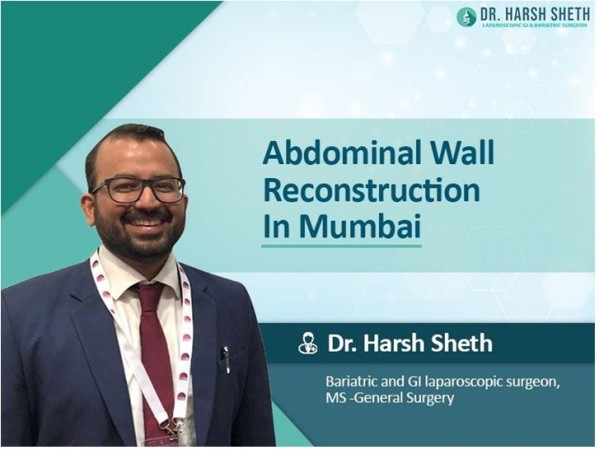
Abdominal wall reconstructive (AWR) surgery is a complex procedure requiring expert surgical skills and relevant experience in repairing weak or defective abdominal walls and hernias.
Abdominal wall reconstructive surgery is a major surgery and it’s important to choose a surgeon who has considerable experience in performing complicated AWR procedures accompanied by reducing the risk factors and having in place amultidisciplinary approach to strengthen the abdominal core for best possible outcomes. Abdominal wall reconstruction in obese patients have worse outcomes and these patients are usually recommended weight loss interventions before opting for surgery to give optimal outcomes.
An abdominal wall hernia refers to the protrusion of abdominal contents through an opening in the abdomen. Usually, this defect occurs in the belly or groin areas. Patients with hernia can complain of a swelling over the abdominal wall which increases in size on coughing or straining, pain, and a sensation of pressure in that area.
As surgery is the only treatment to repair hernias and weak abdominal walls, a reconstructive surgery is performed on patients with abdominal wall defects, including recurrent hernias, large sized hernias, ventral hernias, parastomal hernias etc. The focus of this surgery is to repair and reconstruct the abdominal wall to restore normal anatomy and physiological function of the abdominal wall.
Dr Harsh Sheth, a leading bariatric and laparoscopic surgeon in Mumbai, states,' Abdominal wall reconstruction is a challenging and complex procedure during which the operating surgeon must pay attention to several critical aspects of the reconstruction viz. the condition of the abdominal wall and the musculofascial layer, the skin and the subcutaneous tissue and its potential outcome. Also, planning the postoperative management protocol is essential.’
During the consultation and preliminary examination, the doctor will evaluate risk factors for post-surgical complications to counsel the patient accordingly. The size and location of the hernia and the reason for the abdominal wall reconstruction will determine the surgical approach to repair the wall.
Abdominal wall reconstruction can be performed by minimally invasive methods, both laparoscopic and robotic, which will ensure a faster recovery for patients.
Abdominal wall reconstruction involves an extensive surgery that requires remodeling one’s abdominal wall after damage to the components that form the abdominal core. Apart from repairing the abdominal wall and correcting an existing wall, the surgeon focuses on preventing the recurrence of hernia and strengthening the core.
Inlarger hernia defects, component separation along with midline reconstruction and hernia repair must be performed. A mesh is used to reinforce and strengthen the abdominal corewhich enables patients to experience a normal abdominal wall function.
The advantages of a laparoscopic or robotic abdominal wall reconstruction procedure are minimal scarring and a shorter recovery period. In addition, the patient can return to normal activities sooner as they experience significantly less pain than in an open hernia repair procedure.
In case of non-treatment of hernia or surgical damage, the hernia is likely to grow, leading to the collapse of the abdominal cavity. Hernias also lead to incarceration and strangulation of the intestines, which require emergency surgical treatment, often with suboptimal outcomes. Further, complications such as gangrene or organ rupture or death can also occur. Therefore, hernias can cause morbidity and mortality and must be treated early, once diagnosed.
Dr Harsh Sheth narrates a case of AWR surgery performed to repair a recurring abdominal hernia in a 28-year-old male patient. The patient consulted Dr Harsh with complaints of Swelling and pain around the navel, post 1 year of a previous umbilical hernia repair. He had a history of 2 previous repairs of the same umbilical hernia without placing a mesh. He had a recurrence of the hernia after both surgeries.
The results of a CT scan of the abdomen suggested a recurrent umbilical hernia 5.5* 3.8 cm in size in the umbilical and infra-umbilical region. Hence, it was a case of recurrent ventral hernia.
Dr Harsh recommended a newer modality of abdominal wall reconstruction, the laparoscopic extended Totally Extra-peritoneal (e-TEP) Rives-Stoppa (RS) approach, wherein a space was created between the muscle and the inner lining of the abdomen to place a large 30*20 cm medium weight mesh to prevent any future recurrence. The patient did well post-operatively and was discharged on post-operative day 1. He followed up at 3 months and is happy with the result.
Post the procedure, the patient had to avoid lifting objects heavier than 5 kg for 3 months.
About Dr Harsh Sheth
Dr Harsh Sheth is one of Mumbai's leading advanced laparoscopic, hernia and bariatric surgeons with ten-plus years of experience. He is an expert in performing minimally invasive basic and advanced GI surgeries.
Dr Harsh Sheth is associated with many hospitals in Mumbai, viz. Saifee Hospital, Jaslok Hospital, Wockhardt Hospital, Mumbai Central, and Conwest & Manjula S Badani Jain Charitable Hospital.
Patients can reach Dr. Harsh Sheth at +91-9819388836